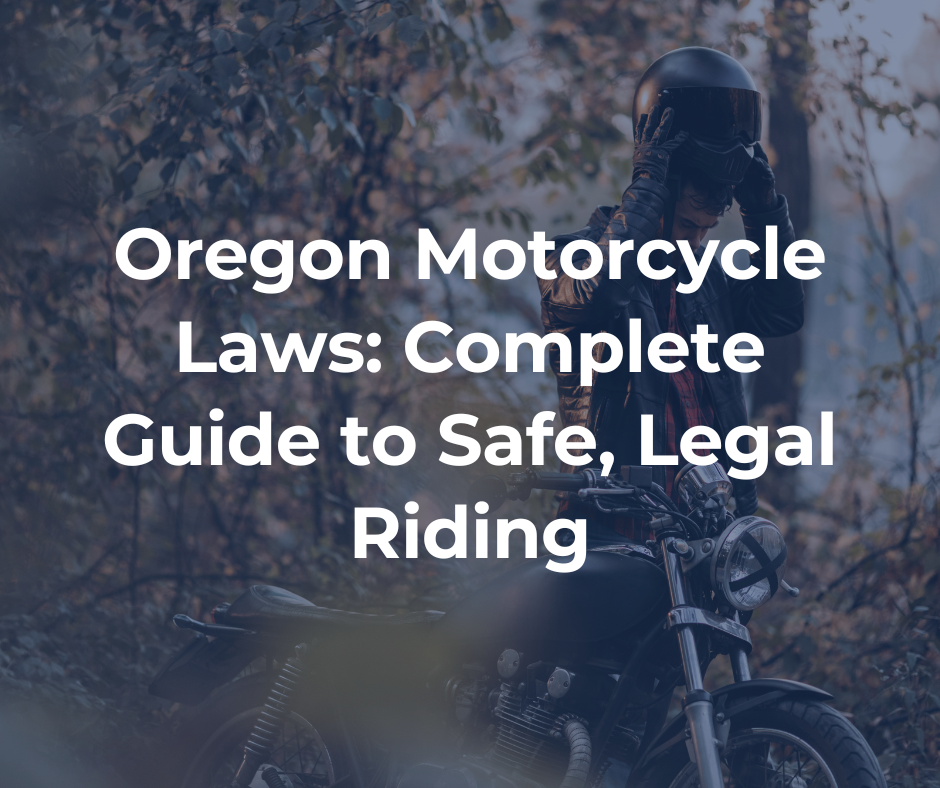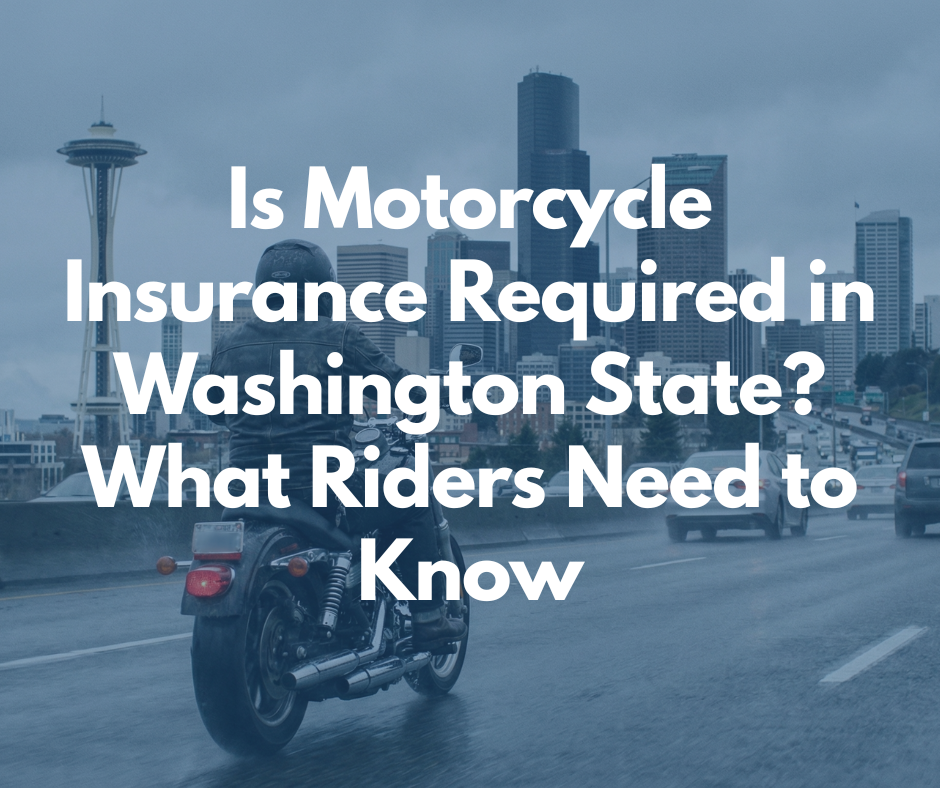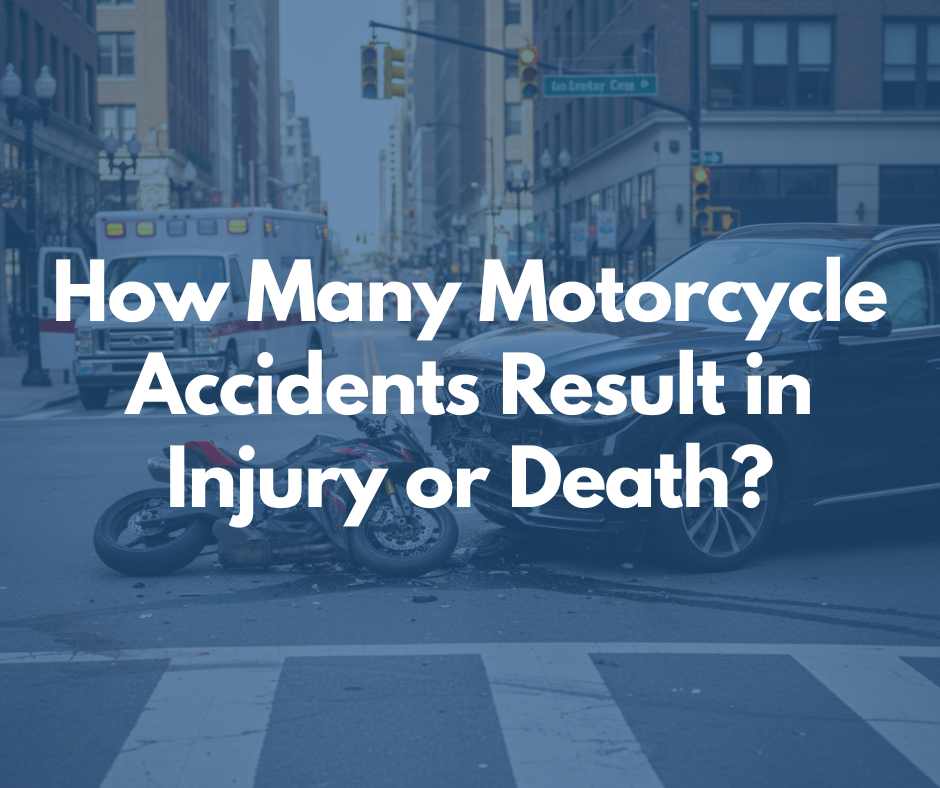
TL;DR: Key Points
- Oregon has a universal helmet law with no exceptions—all riders and passengers must wear DOT-approved helmets regardless of age, experience, or riding distance under ORS 814.269
- 55 motorcycle riders died and over 700 suffered serious injuries in Oregon last year, making legal compliance and safety knowledge critical for all riders
- Lane splitting and lane filtering are illegal in Oregon as of 2025, despite ongoing legislative discussions—violations can significantly impact fault determination and insurance claims after accidents
- Electric motorcycles are regulated identically to gas-powered bikes in Oregon, requiring valid endorsements, DOT helmets, proper registration, insurance, and DMV-compliant safety equipment
- Oregon has no minimum age for passengers but requires physical capability—passengers must have dedicated seats, footpegs, and the ability to maintain balance and follow safety instructions
- Two motorcycles can ride side-by-side within the same lane, though extra caution is required during adverse weather or heavy traffic conditions
- Out-of-state riders must follow Oregon's laws including mandatory helmet use, regardless of their home state's regulations—Oregon's requirements align with Washington and California's comprehensive helmet laws
Oregon's scenic highways and winding mountain roads make it a paradise for motorcycle enthusiasts. However, understanding the state's motorcycle laws is essential for both safety and legal compliance. Whether you're a seasoned rider or new to the Oregon roads, this comprehensive guide from our team of motorcycle injury lawyers at Metier Law Firm covers everything you need to know about motorcycle regulations in the Beaver State.
The Reality of Motorcycle Safety in Oregon

According to the Oregon Department of Transportation's latest crash data, 55 motorcycle riders tragically lost their lives last year, with over 700 suffering serious injuries. These statistics underscore the importance of understanding and following Oregon's motorcycle laws. Not just for legal compliance, but for your safety and protection.
When accidents occur, the legal landscape can be complex. Understanding your rights and responsibilities under Oregon law becomes crucial for protecting your interests and ensuring proper compensation for injuries caused by others' negligence.
"When riders get hurt, they're facing not just physical recovery, but also complex legal battles with insurance companies," explains Patrick DiBenedetto, a motorcycle crash attorney and partner at Metier Law Firm. "Riders deserve advocates who understand the road and will fight to protect their rights."
Oregon's Universal Helmet Law: Mandatory Protection for All Riders
Oregon maintains one of the nation's most comprehensive helmet laws. Under ORS 814.269, all motorcycle riders and passengers must wear DOT-approved helmets. There are no exceptions based on age, experience, or riding distance.
Key Helmet Law Requirements:
- Universal application: Covers all riders and passengers regardless of age or experience level
- DOT certification required: Helmets must meet Department of Transportation safety standards
- No exemptions: Unlike some states, Oregon provides no exceptions for experienced riders
- Legal consequences: Violations can result in fines and may impact insurance claims or personal injury cases
Important Note for Out-of-State Riders
If you're visiting Oregon from states like Idaho or Montana where adult helmet use is optional, remember that Oregon law applies regardless of your home state's regulations. This universal requirement aligns Oregon's laws with Washington and California's comprehensive helmet regulations.
Electric Motorcycle Regulations in Oregon
As electric motorcycles like the Zero SR/F and Harley LiveWire gain popularity, Oregon treats these vehicles identically to traditional gas-powered motorcycles. There are no special exemptions or different requirements for electric bikes.
Electric Motorcycle Requirements:
- Valid Oregon motorcycle endorsement
- DOT-approved helmet (universal requirement)
- Proper motorcycle registration and insurance
- DMV-compliant lighting and safety equipment
Potential Benefits: Some electric motorcycles may qualify for state EV rebates based on battery range and charging capabilities, but road regulations remain identical to conventional motorcycles.
Lane Splitting Laws in Oregon: Current Status and Future Considerations
Despite ongoing discussions and legislative proposals, including House Bill 2314, lane splitting and lane filtering remain illegal in Oregon as of 2025. This distinguishes Oregon from California, where lane splitting is permitted under specific conditions.
Prohibited Activities Include:
- Riding between lanes of moving or stopped vehicles
- Filtering to the front of traffic at intersections
- Using road shoulders to bypass traffic congestion
Legal Implications
Violating lane splitting laws can significantly impact your legal standing if you're involved in an accident. Insurance companies and courts may view lane splitting violations as contributing factors in determining fault and liability.
Need legal guidance after a motorcycle accident? If you've been injured due to someone else's negligence, understanding your rights under Oregon law is crucial. Contact Metier Motorcycle Lawyers at 833-4MOTO-LAW (833-466-8652) for a free consultation to discuss your case and protect your interests.
Motorcycle Passenger Laws: Safety Over Age Restrictions
Oregon takes a practical approach to motorcycle passengers, focusing on safety capabilities rather than arbitrary age limits. The state doesn't specify a minimum age for passengers but requires that all passengers can ride safely and securely.
Passenger Requirements:
- Dedicated passenger seat: Properly installed and secure
- Passenger footpegs: Must be available and accessible
- Physical capability: Passenger must be able to maintain balance and hold on securely
- Ability to follow instructions: Passenger should understand and respond to basic safety directions
This means while a child might legally ride as a passenger, they must demonstrate the physical and mental capability to ride safely without constant support.
Additional Oregon Motorcycle Laws Every Rider Should Know
Group Riding Regulations

Oregon permits two motorcycles to ride side-by-side within the same lane, but riders should exercise additional caution during adverse weather conditions or heavy traffic situations.
Motorcycle Modifications and Equipment
Aftermarket modifications must comply with Oregon DMV guidelines:
- Exhaust systems: Must meet state noise regulations
- Lighting modifications: Underglow and additional lighting must conform to legal standards
- Safety equipment: All modifications should prioritize safety and legal compliance
Out-of-State Rider Considerations
Visitors to Oregon must comply with all state motorcycle laws, including mandatory helmet use, regardless of their home state's requirements. This applies to both residents and tourists traveling through Oregon.
Legal Protection and Rider Rights
Understanding your legal rights is crucial when dealing with motorcycle accidents caused by others' negligence. Oregon's comparative fault system means that understanding and following all traffic laws can significantly impact your ability to recover damages after an accident.
When Legal Help Is Needed
If you've been injured in a motorcycle accident, several factors can affect your case:
- Compliance with helmet laws
- Adherence to lane usage regulations
- Proper licensing and insurance coverage
- Understanding of comparative fault principles
Frequently Asked Questions About Oregon Motorcycle Laws
Does Oregon require motorcycle helmets for all riders?
Yes. Oregon law mandates DOT-approved helmets for all motorcycle riders and passengers. There are no exemptions for age or experience.
Is lane splitting legal in Oregon?
No. Lane splitting and filtering are prohibited under current Oregon law.
Are there age restrictions for motorcycle passengers?
Oregon doesn't specify a minimum age but requires passengers to have proper seating, footpegs, and the physical ability to ride safely.
Do electric motorcycles have different legal requirements?
No. Electric motorcycles are subject to identical laws as gas-powered bikes. This includes endorsement, helmet, and insurance requirements.
Is a motorcycle endorsement required in Oregon?
Yes. Operating a motorcycle in Oregon requires a valid motorcycle endorsement on your driver's license.
What should I do if I'm injured in a motorcycle accident?
Seek immediate medical attention, document the scene, contact law enforcement, and call Metier Motorcycle Lawyers to protect your rights.
The Importance of Legal Compliance and Safety

Oregon's motorcycle laws exist to protect riders and other road users. By understanding and following these regulations, you're not only avoiding legal complications but also taking important steps to ensure your safety and the safety of others on the road.
Remember that following Oregon's motorcycle laws goes beyond avoiding tickets. It can significantly impact your rights and recovery options if you're ever involved in an accident. Stay informed, ride safely, and always prioritize legal compliance.
For riders who have been injured due to others' negligence, understanding your legal rights and options is essential. Professional legal guidance can help navigate the complex intersection of motorcycle laws, insurance requirements, and personal injury claims.
When Accidents Happen: Legal Protection for Riders
Even law-abiding riders can become victims of accidents caused by negligent drivers. If you've been injured while following Oregon motorcycle regulations, legal assistance is available.
Metier Law Firm has decades of experience representing injured motorcyclists throughout Oregon. Our team understands both the riding culture and the legal complexities that follow motorcycle accidents.
Contact us for a free consultation:
- Phone: 833-4MOTO-LAW (833-466-8652)
- Website: www.metierlaw.com
Disclaimer: This content is for informational purposes only and does not constitute legal advice. Laws can change, and individual circumstances vary. For specific legal questions or if you've been injured in a motorcycle accident, consult with an attorney from Metier Law Firm.
Tell Us About Your Case – Free Case Review with a Oregon Motorcycle Accident Lawyer
Tell Us About Your Case – Free Case Review with a Personal Injury Lawyer
(866) 377-3800Our Locations
.webp)
Do I have a Case?
How Much Should I Be Offered?
Do I Need an Attorney?
If these questions have crossed your mind, let us help. You may need a little direction or may not need an attorney at all, but you deserve to be confident knowing your options. We can provide you with information about our Attorneys of the West® accident investigations and legal services. Your confidential consultation with us is totally free.
Keep up with us!

.svg)




